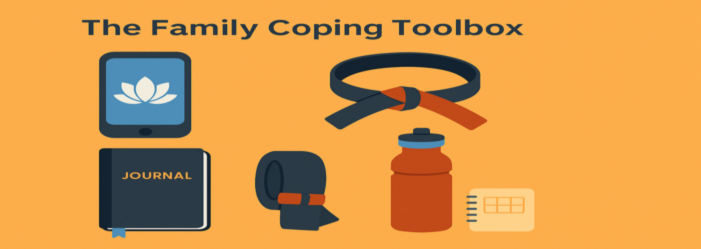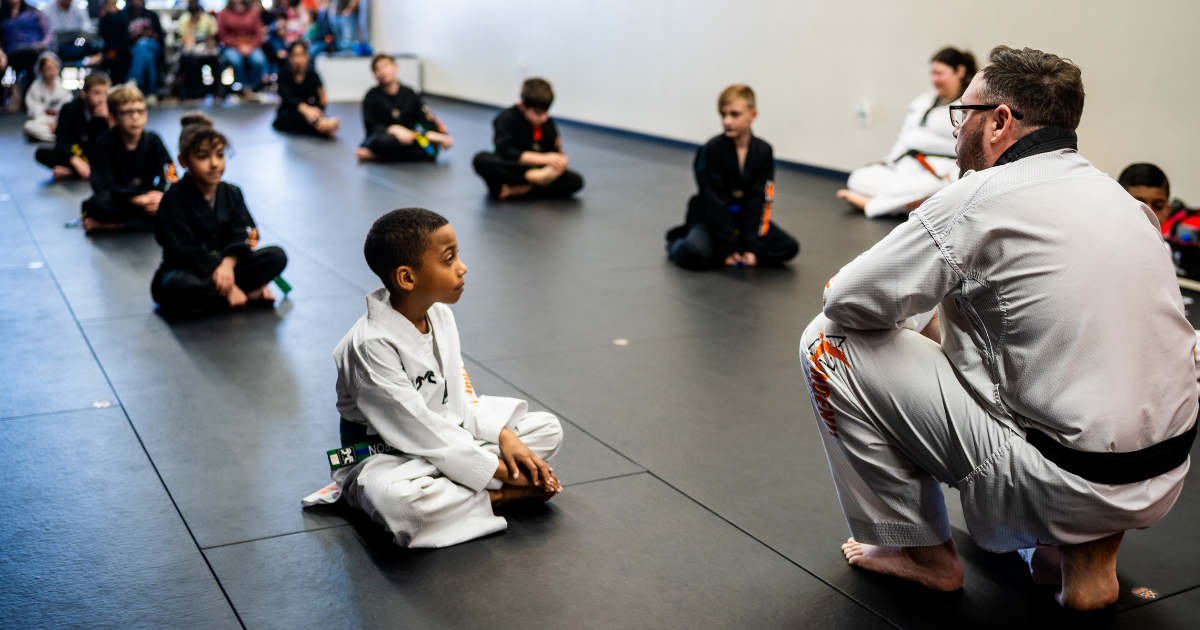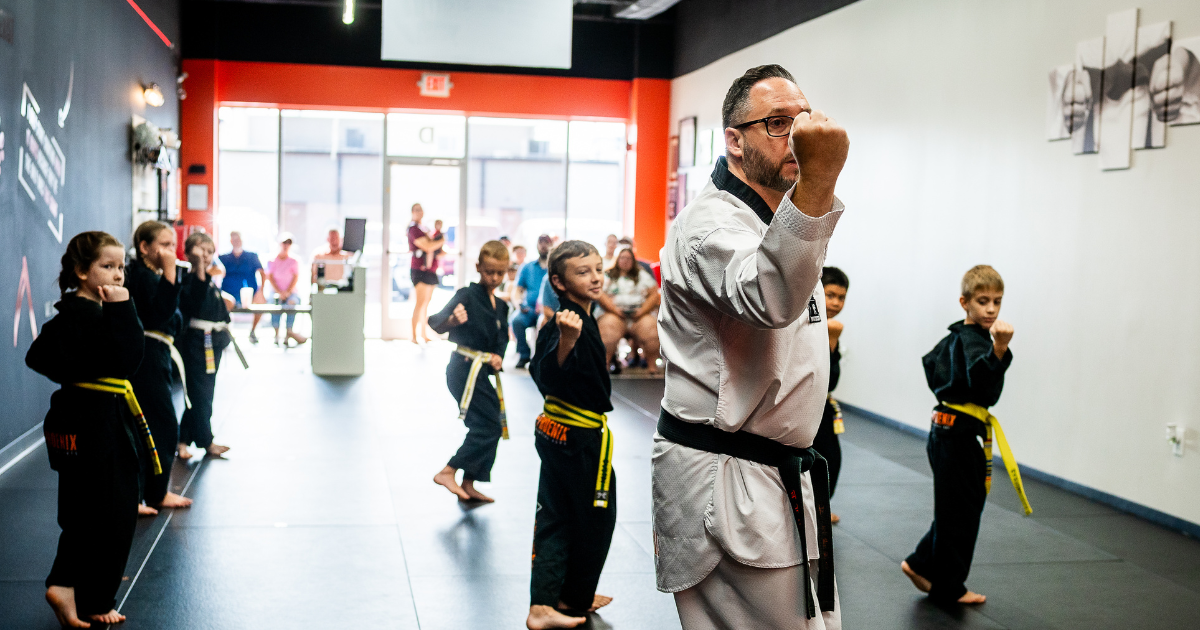Anxiety Doesn’t Have to Win: A Parent + Child Guide to Building Emotional Strength
Adolescent anxiety is on the rise — and many Murfreesboro parents are unsure how to help.

At Phoenix Martial Arts, we believe anxiety isn’t something to fear, but something to face together. With practical tools, shared structure, and clear communication, families can turn anxious energy into emotional strength — one small step at a time.
TL;DR
- Adolescent anxiety is common — but manageable with the right tools
- Open communication is more powerful than advice
- Routines and regulation beat pressure and perfection
- Kids mirror parent energy — model calm, not control
- Use simple, shared coping strategies to build resilience together
Understanding Adolescent Anxiety
At Phoenix Martial Arts, we’ve worked with hundreds of Murfreesboro families — and anxiety in pre-teens and teens is one of the most common (but least talked about) challenges parents bring to us.
During adolescence, anxiety can look like:
- Sudden irritability or outbursts
- Perfectionism or fear of failure
- Withdrawing from friends or family
- Physical symptoms like stomachaches or fatigue
These aren’t signs of weakness — they’re signals that your child is overwhelmed.
The triggers? Academic pressure, social comparison online, changing hormones, and often, a lack of structure or healthy coping tools.
The good news: That structure can be built. Through routine, physical activity, and confidence-building skills, kids can gain tools that reduce anxiety — and learn to face it head-on.
(In fact, many parents tell us their child’s anxiety improved within weeks of starting martial arts classes. It’s not a magic fix — but it is a consistent one.)
🔗
Explore more:
American Psychological Association — Anxiety Basics
Modeling Calm — Even When You’re Not
At Phoenix Martial Arts, we always say:
“Kids don’t do what you say. They do what you show them.”
That’s why one of the most powerful things a parent can do for an anxious child is to model calm under pressure — not perfection.
Feeling overwhelmed? That’s normal. But narrating your way through stress teaches your child emotional regulation in real time.
Instead of hiding your feelings, try:
“I’m feeling stressed after work, but I’m going to take three deep breaths and shake it off.”
That’s leadership. That’s modeling.
We’ve seen it on the mats too. One Phoenix parent started doing breathing exercises with their child before class instead of rushing through drop-off. It became their ritual. That child — who once cried before class — now walks in calm, focused, and proud.
🧭 Parent Modeling Checklist (Phoenix-Style)
- Name emotions clearly: “I’m nervous, but I’m going to push through.”
- Model effort, not results: Show your child you can struggle and still try again.
- Co-regulate: Breathe with your child, stretch with them, walk with them.
- Ask for help: Therapy, coaching, or a chat with another parent in the lobby.
- Celebrate progress: Even 10% better is worth a high five.
Build a Bridge Before You Give Advice
One of the biggest struggles parents share with us at Phoenix Martial Arts?
“They just won’t talk to me anymore.”
And it’s no surprise. When kids are anxious, they don’t always act anxious — they withdraw, explode, or say “I don’t know” to every question.
That’s why communication isn’t just a soft skill — it’s a survival skill for families. And it starts with safety, not solutions.
We teach our students to speak respectfully and clearly in class. But the real win is when they take those habits home — and start connecting with their parents again.
🧠 How to Encourage Communication (Phoenix-Style)
- Build a “judgment-free mat.” Kids open up when they feel safe from being corrected or “fixed.”
- Validate before you solve. Try: “That sounds frustrating” instead of “It’s not a big deal.”
- Check in like it’s a habit. Even a two-minute talk at bedtime builds trust.
- Watch your tone, not just your words. Calm voice = open door.
- End on connection. A laugh, handshake, or hug restores the bond.
🥋 “Connection before correction.”
It’s one of our mantras — and it works even better at home.
Tools That Actually Work (Even on Tough Days)
Anxious kids don’t need lectures. They need tools — simple, repeatable actions that help them reset.
That’s why we teach every student how to build their own
Coping Toolbox — and encourage parents to do the same.
🧘 Breathing Anchors
Build calm into your daily rhythm. Use apps like Headspace or Insight Timer.
Try this: Box breathing — in for 4, hold for 4, out for 4, hold for 4.
🥋 Movement with Purpose
Physical activity burns off stress. Martial arts adds structure, mastery, and focus.
Even 15 minutes a day makes a difference.
📵 Digital Detox Time
No screens 1 hour before bed. Instead: stretch, journal, or talk.
Kids at Phoenix love unplugging once they get used to it.
📅 Predictable Routines
Consistency creates security. Build and post a weekly routine.
We thrive on structure — so do kids.
🎨 Creative Outlets
Martial arts builds focus, but creativity builds expression.
Drawing, music, or teaching you a skill (they love this).
“My son started teaching me his white belt form. That little leadership moment changed his whole week.” — Phoenix Parent
🛠️ Want help building your child’s Anxiety Toolbox?
👉
[Drop in for a trial class] and let them experience it firsthand.
✅ Shared Family Checklist: Small Habits, Big Impact
🗓️
Create Structure
Parent: Stick to wake-up/bedtime routines Kid: Use a simple planner or whiteboard
💪
Build Resilience
Parent: Model your own coping tools Kid: Use one daily coping tool
❤️
Strengthen Connection
Parent: Plan a low-pressure hangout Kid: Share one feeling each week
🚨
Manage Triggers
Parent:
Keep a “stress radar” and reflect Kid: Name a trigger + use a calming tool
🌱 Need More Support? You’re Not Alone.
Phoenix is here for you — but sometimes you need more. That’s not weakness. That’s wisdom.
🧭 Resources We Trust
- National Institute of Mental Health
- The Jed Foundation
- Calm Clinic
- Mental Health America
- BetterHelp
- Need a local Murfreesboro therapist? Just ask — we’ve got a trusted list.
📝 Spotlight Tool: Journaling for Emotional Clarity
Journaling helps kids:
- Build emotional awareness
- Process stress
- Sleep better
- Gain control over “big” feelings
Phoenix students use journals to track goals and reflect on their week.
You can start with:
Tool:
One Line a Day Journal
What It Does:
Quick Daily Memory
Best For:
Reluctant Writers
Tool:
Daylio App
What it Does:
Visual Mood Tracker
Best For:
Tech-Savvy Teens
Tool: Panda Planner
What it Does: Gratitude + Goals
Best For:
Structured Thinkers
Tool:
Five Minute Journal
What it Does: Affirmation & Reflection
Best For:
Parent-Child Routines
🎯 [Download the Phoenix Reflection Sheet (PDF)] — A 5-question tool to guide end-of-day clarity.
💡 Try journaling together right after brushing teeth — it’s a calm screen-free win.
🧠 Glossary: Speak the Same Language as Your Kids
Term:
Anxiety Trigger
Definition (Phoenix Style):
Thought or situation that sparks stress
Term:
Cognitive Reframing
Definition (Phoenix Style):
Changing your lens: “failure” → “learning”
Term:
Modeling Behavior
Definition (Phoenix Style):
Teaching through action, not advice
Term:
Mindfulness
Definition (Phoenix Style): Focused presence without judgment
Term:
Resilience
Definition (Phoenix Style): Bouncing back and growing stronger
❓FAQ: What Parents Ask Us Most
Q1: Is it stress or anxiety?
👉 If it lasts for weeks and affects sleep, school, or mood — it’s anxiety.
Q2: What not to say?
🚫 “Just calm down.”
✅ Try: “That does sound tough. Want help?”
Q3: Is screen time bad?
Depends. Social media can harm. But tools like journaling apps can help. It’s all about intent.
Q4: What if therapy feels scary?
Present it as coaching: “We’re learning better tools — together.”
Q5: Can my kid help me too?
Yes! Kids can remind you to breathe, slow down, or take a break. It’s a team effort.



